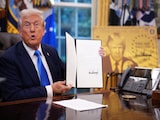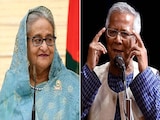Chief Justice BR Gavai recalled a 2013 Bollywood movie - 'The Lunchbox', starring Irrfan Khan, Nawazuddin Siddiqui, and Nimrat Kaur - on his four-day official visit to Bhutan, widely recognised as one of the 'happiest' countries in the world.
Watching this movie, he said at an event held by the Jigme Singye Wangchuck School of Law at Thimphu's Royal Institute of Management, prompted me to reflect on what makes Bhutan so unique and why it is associated with contentment, balance, and a deep sense of well-being.
"This sense of harmony between the material and the moral... the individual and the collective... lies at the heart of the shared philosophical inheritance that binds India and Bhutan," he said.
"Ours is a relationship that extends beyond borders and centuries. Our relationship is nurtured by a common civilizational spirit... one that finds its most eloquent expression in the teachings of the Lord Buddha," he said.
In 'The Lunchbox", Ila, a young homemaker in Mumbai repeatedly expresses her desire to leave behind the noise, chaos, and monotony of city life and move to Bhutan, a land she imagines as peaceful, serene, and truly happy. She tells Saajan Fernandes, the widowed accountant she corresponds with, Bhutan is the happiest country, and that she hopes to find happiness there.
In his address, the Chief Justice also expressed deep admiration for Bhutan's Constitution, noting that its Directive Principles urge the State to secure a good quality of life for its people, promote peace and harmony, and create conditions necessary for Gross National Happiness.
He remarked, "In this sense, Bhutan offers a constitutional vocabulary that marries justice with joy, rights with responsibilities, and liberty with collective flourishing." He further observed this framework invites courts to expand their understanding of justice beyond corrective or deterrent functions, towards a jurisprudence that values compassion and ecological balance.
During his visit, Chief Justice Gavai also called on the Chief Justice and Judges of the Supreme Court of Bhutan. The two Chief Justices discussed areas of mutual interest, including institutional partnerships, judicial exchanges, and future collaborations.
Chief Justice Gavai reaffirmed the enduring friendship between India and Bhutan and extended an invitation to members of the Bhutanese judiciary to visit the Supreme Court of India.
He also planted a sapling within the Bhutanese Supreme Court premises, symbolising the shared commitment of the two judiciaries to sustainability and environmental stewardship.
He also reiterated India's commitment to supporting the Bhutanese judiciary through initiatives aimed at enhancing technological capacity and system integration.















